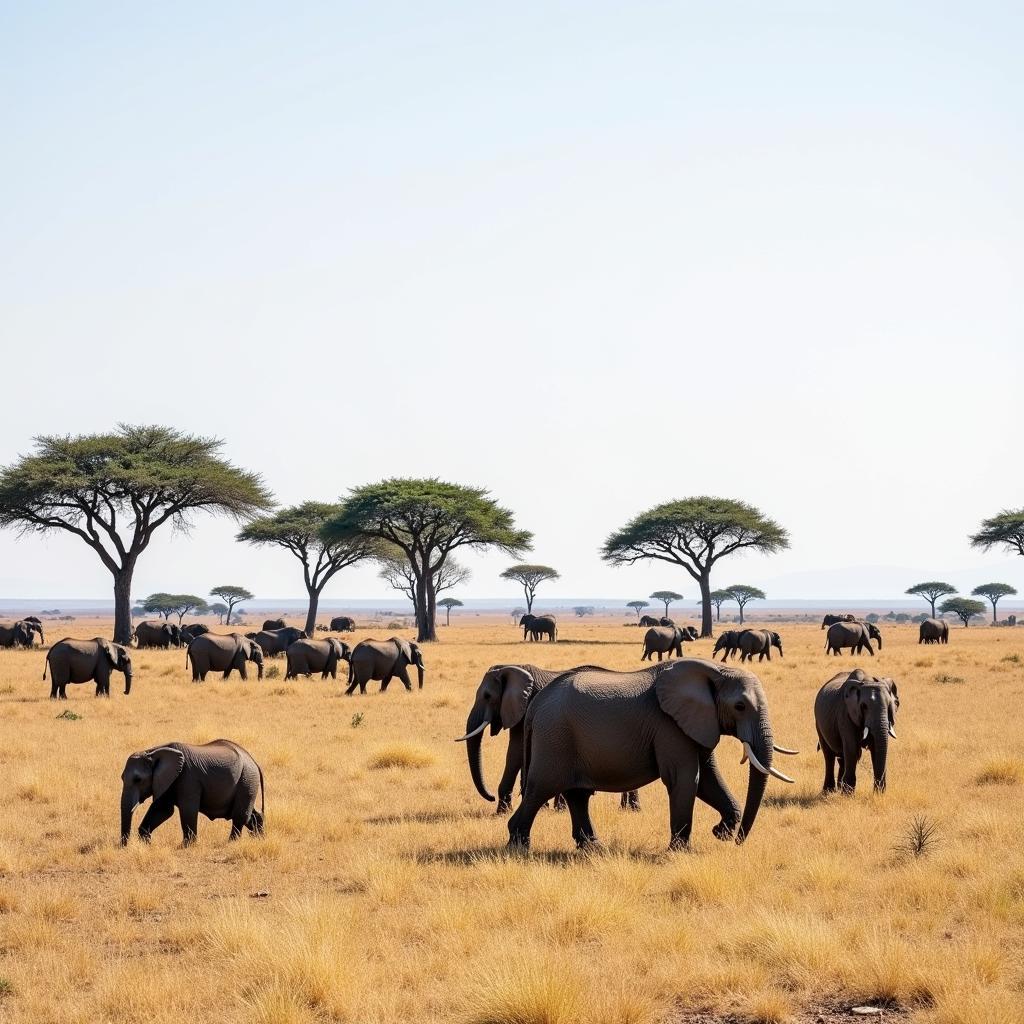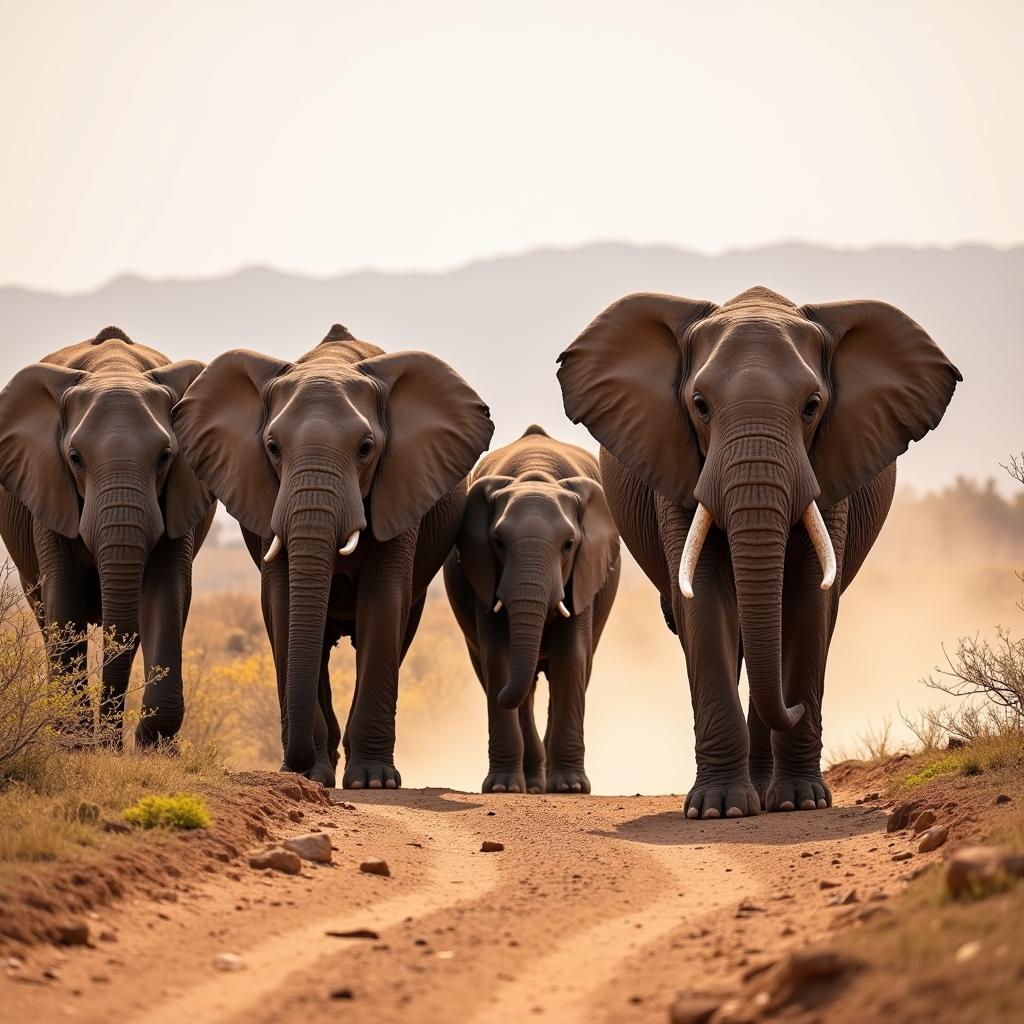African Elephant Habitat Facts: Where Giants Roam
The African elephant, an iconic symbol of the savanna, is a creature of immense size and intelligence. Understanding African Elephant Habitat Facts is crucial for appreciating their role in the ecosystem and the challenges they face. These gentle giants are not confined to one specific environment but rather thrive in a variety of habitats across the African continent.
African Elephant Habitat: More Than Just Savannas
While often pictured roaming vast savannas, African elephants inhabit a diverse range of habitats, each playing a crucial role in their survival.
Savannas: A Classic African Elephant Home
 African Elephant in Savanna Habitat
African Elephant in Savanna Habitat
The African savanna, with its sprawling grasslands and sparse trees, is perhaps the most iconic African elephant habitat. These areas offer an abundant food supply, with elephants consuming up to 300 pounds of vegetation daily. The savanna’s scattered waterholes provide essential hydration, especially during the dry season.
Forests: A Haven for Forest Elephants
 African Forest Elephant in Dense Forest
African Forest Elephant in Dense Forest
Contrary to popular belief, not all African elephants are creatures of the open plains. African forest elephants, a distinct species, have adapted to life in dense forests. These areas provide cover from the sun and predators but often present challenges in finding sufficient food.
Deserts: Adapting to Arid Landscapes
 Desert-Adapted African Elephants Searching for Water
Desert-Adapted African Elephants Searching for Water
Even the harshest landscapes are not beyond the reach of African elephants. Desert-dwelling elephants, like those in Namibia, have developed remarkable adaptations to survive in these arid regions. They can detect water sources from miles away and possess physiological adaptations to conserve water.
Factors Influencing African Elephant Habitat Selection
Several factors dictate where African elephants choose to roam, highlighting their adaptability and the delicate balance of their ecosystem.
Food Availability: A Driving Force
As herbivores with enormous appetites, African elephants are constantly on the move in search of food. Their habitat selection is heavily influenced by the availability of grasses, fruits, leaves, and bark, their dietary staples. Seasonal changes in vegetation play a significant role in their movement patterns.
Water Sources: Essential for Survival
african elephant extinction facts: Learn more about the threats to elephants.
Water is crucial for African elephants, especially for lactating mothers and their calves. Their habitats must provide access to reliable water sources, particularly during the dry season when water becomes scarce. Elephants are known to dig for water in dry riverbeds, showcasing their resourcefulness.
Competition and Predation: A Constant Struggle
African elephants face competition for resources from other herbivores, especially during periods of drought. While adult elephants have few predators, young calves are vulnerable to attacks from lions, hyenas, and crocodiles, influencing habitat choices for elephant herds with young.
Threats to African Elephant Habitats
The survival of African elephants is intertwined with the health of their habitats, which are increasingly under threat.
Habitat Loss and Fragmentation: A Growing Concern
The expansion of human settlements, agriculture, and infrastructure development encroaches upon elephant habitats, leading to fragmentation and degradation. This limits their access to resources and increases the risk of human-elephant conflict.
Climate Change: A Looming Threat
Climate change exacerbates existing threats to elephant habitats. Prolonged droughts, altered rainfall patterns, and increased temperatures stress water sources and vegetation, directly impacting elephant survival.
Poaching: A Persistent Danger
The illegal ivory trade continues to pose a grave threat to African elephants, decimating populations and disrupting social structures. Anti-poaching efforts and international cooperation are crucial to combat this illegal activity.
Conservation Efforts: Protecting African Elephant Habitats
Numerous initiatives are underway to protect African elephants and their habitats, focusing on both immediate and long-term solutions.
Establishing Protected Areas: Safe Havens for Elephants
National parks and reserves play a vital role in safeguarding elephant populations and their habitats. These protected areas provide a safe haven from poaching and habitat loss, allowing elephants to thrive.
Community-Based Conservation: Engaging Local Communities
Recognizing the importance of local communities, conservation efforts increasingly involve those living alongside elephants. This includes promoting sustainable land use practices, mitigating human-elephant conflict, and creating economic opportunities linked to elephant conservation.
Conclusion: Securing a Future for African Elephants
Understanding African elephant habitat facts is not just about appreciating their remarkable adaptations but also about recognizing the challenges they face. By supporting conservation efforts, promoting responsible tourism, and advocating for elephant-friendly policies, we can contribute to securing a future for these magnificent creatures and the diverse habitats they call home.
FAQ: African Elephant Habitats
1. What is the main habitat of African elephants?
African elephants inhabit a variety of habitats, including savannas, forests, and even deserts. Their preferred habitat depends on factors like food and water availability.
2. How do African elephants impact their habitat?
Elephants are considered keystone species, meaning their presence significantly shapes the ecosystem. They create clearings in forests, disperse seeds, and dig waterholes used by other animals.
3. How does climate change affect African elephant habitats?
Climate change leads to more frequent and severe droughts, impacting water availability and vegetation growth, crucial for elephant survival.
4. What can I do to help protect African elephant habitats?
You can support conservation organizations, make responsible tourism choices, raise awareness about elephant plight, and advocate for policies protecting elephants and their habitats.
Do you have other questions about African elephants? Explore these related articles:
For any further inquiries or assistance, please do not hesitate to contact us:
Phone Number: +255768904061
Email: [email protected]
Address: Mbarali DC Mawindi, Kangaga, Tanzania
Our dedicated customer support team is available 24/7 to assist you.
